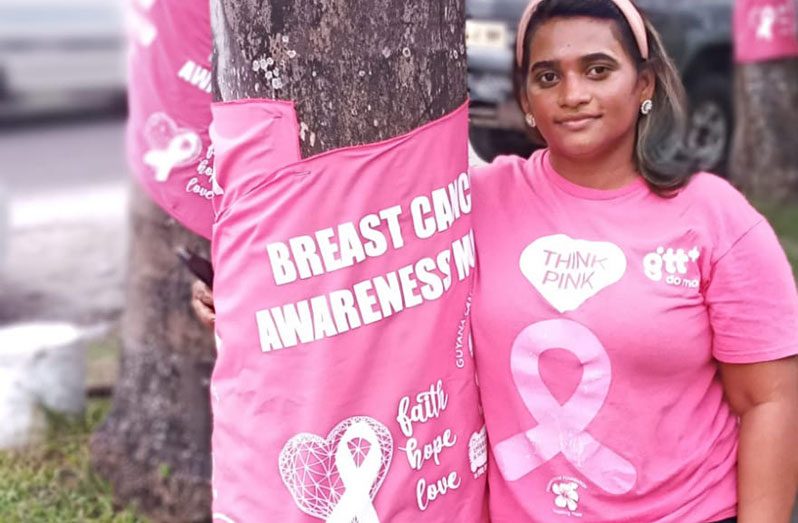–specialists recommend healthier lifestyle, regular screening for all women
AS a 42 year-old mother who discovered in 2019 that she had ovarian cancer, Diane Fung went into a downward spiral, but it was a supportive group of peers that helped her to recover. Educating herself on the cancer has also given her much hope and well-being.
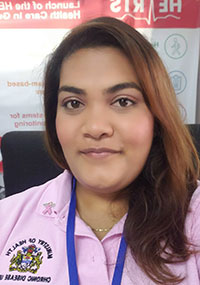
Ovarian cancer is a growth of cells that forms in the ovaries. The cells multiply quickly, and can invade and destroy healthy body tissue. The treatment of ovarian cancer usually involves surgery and chemotherapy.
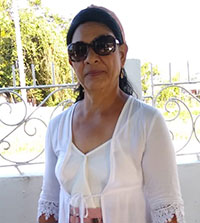
The Mon Repos, East Coast Demerara resident is a mother of three daughters, aged 22, 20, and 16.
She discovered she had ovarian cancer after experiencing a severe abdominal pain, and an ultrasound done, subsequently, revealed a 10 cm cyst on her ovary.
“I was put to do an emergency surgery, and I signed a paper to remove one of my ovaries. And after the surgery, the doctor told me that there was no need to remove the other ovary, because everything seemed fine. Three months after, March 2019, I observed I was feeling the same pain again in my tummy,” Mrs. Fung told this publication.
She then contacted her sister, who was her tower of strength during her many hospital visits. She said that it was her sister who advised her to seek private medical attention in order to get another perspective before returning to the public hospital.
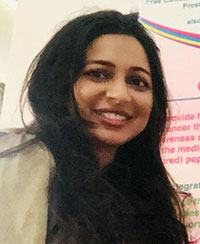
“When we go there, I did an ultrasound, and we found out that the other ovary had a cyst. We then went to various doctors to ensure we understood exactly what is taking place, and we ended up at a doctor at Medical Arts Hospital, and that doctor took me to do a CA 125 test,” she recalled.
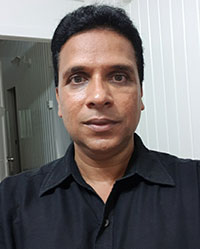
According to medical experts, a CA 125 test measures the amount of the protein (cancer antigen 125) in your blood. The test may also be used to monitor certain cancers during and after treatment. In some cases, a CA 125 test may be used to look for early signs of ovarian cancer in people with a very high risk of the disease.
“After that test, I found out I had cancer on my ovaries. I was so much in shock and trauma that I was telling myself I had this thing all the time inside of me, and I wondered why the other doctor didn’t remove the other ovary in the first place when I had my first surgery…I cried a lot,” she said.
GOOD SUPPORT IS KEY
Studying all of the negative consequences that raced through her mind in the aftermath of the diagnosis, Mrs. Fung said everything in her mind circulated around her demise, instead of handling the situation in a logical manner.
She now understands the importance of getting a strong support system, once you are diagnosed with the disease.
“It was a very rough time for me, and I was thinking about death all the time. It was very depressing, but eventually I educated myself on the Internet on how I can make myself better, and I found a few friends who also had cancer, and they gave me the courage and they were my support group,” she reflected.
She said WhatsApp groups were also created to ensure that everyone was there for each other as the need arose.
But breaking the news to her family, she said, was very challenging.
“When it was time to tell my daughters and my husband, I sat down in front of them and started to cry, and they immediately wanted to know what was wrong. I didn’t tell them, at first, how serious the situation was, and I lied to them. I just told them I was going to be well, and my second surgery would go well after the treatment. I didn’t even mention that I had cancer to them, and the strain it was putting me through,” she said with tears in her eyes.
She told the Guyana Chronicle that she continued to lie to her family for some time, because she did not want them to go through the emotional pain and turmoil that she was experiencing.
However, Mrs. Fung said she eventually explained everything to them, and she would advise anyone who is confronted with any form of cancer to educate themselves on the best method and options available to keep healthy, while finding a support group where they can feel comfortable sharing their emotions, trials and experiences.
“I would tell anyone, if you are in constant pain, don’t take anything for granted; seek medical attention. Sometimes it can save your life, and give you a fighting chance if something is actually wrong with you. Keep giving yourself a medical check-up every six months if you are not well,” she advised.
She is now feeling better, and has more energy again. According to her, cancer should be talked about all year long, and not just in October during Breast Cancer Awareness Month.
Mrs. Fung said, too, that support looks different for everyone battling cancer, and the best thing to do is ask how to best help others.
HARD TO DETECT
Meanwhile, Consultant Gynecologist at the Georgetown Public Hospital Corporation (GPHC), Dr. Raveendranath Raghuram said that unlike other gynaecologic cancers, there are no screening tests for ovarian cancer.
He told the Guyana Chronicle that while some women diagnosed with ovarian cancer have elevated levels of the CA 125 protein, the associated blood test is not accurate enough for ovarian cancer screening, as many noncancerous conditions can increase the CA 125 level.
Dr. Raghuram explained that ovarian cancer is hard to detect in its early stages, due to its vague symptoms. Women may experience constipation, bloating, early satiety after eating, and back pain.
While ovarian cancer tends to occur in post-menopausal women, he said, anyone can be at risk. A number of factors, including smoking, endometriosis, polycystic ovary disease, and obesity can raise a woman’s risk for the disease.
According to Dr. Raghuram, women should start pap smear screening at age 21. Between the ages of 21-29, women whose pap smears are normal only need it repeated every three years. Women aged 30 and over should have testing for the human papillomavirus (HPV) with their pap smear.
HIGH MORTALITY RATE
Recently, Dr. Shivani Samlall wrote a column on ovarian cancer, which was published in this newspaper. She noted that most women have an approximately one in 70 chances of being diagnosed with this type of cancer.
“While the number of women that are affected by this disease is low, the mortality rate, or the number of women who die from this disease is extremely high. This is because, unlike cancers such as Breast and Cervical, Ovarian cancers do not have screening, which means that there is no test that can singlehandedly be used to diagnose this cancer in its early stages, or prevent death from this disease. This ultimately leads to late detection, and a high death rate,” she explained.
Dr. Samlall said surgery is the main treatment option in both early and advanced stages of the disease, as well as for women with recurrence (cancer that comes back after treatment). The type of surgery will depend on the type of ovarian cancer, and the extent of it.
“It therefore becomes necessary for women to have regular, routine, or yearly well-woman exam, where risk factors can be identified, and symptoms (while they are unspecific) can be interpreted. And once there is a high suspicion for Ovarian Cancer, patients should be managed by an Ovarian Cancer specialist,” she explained.
BREAST CANCER DIAGNOSIS
This publication also spoke with Nanranie Deochand, 56, of Windsor Forest, West Coast Demerara, who said her journey began in October 2020, with tests that later confirmed she had breast cancer.
“There was no symptoms, in my opinion, of cancer. I firstly visited the doctors for issues with my stomach, because I felt that my food was not digesting, and I later started getting fever. Then my right side breast started discharging a dark, cream liquid, and I was then placed to do some test by the doctor,” Mrs. Deochand explained to the Guyana Chronicle.
She later confirmed that all was not well, and there was something not right with her body.
Mrs. Deochand, who has three children aged 36, 26, 24, said the doctor did not reveal his thoughts to her in the beginning, but advised her to do more specialised tests.
Eventually, she was guided to the Oncology Unit of the GPHC, where a mammogram, a sonogram, a C-T scan, and other related tests were done. These results would confirm her worst fears, and she was transferred to the surgical clinic.
After agreeing to surgery, Mrs. Deochand said that her relatives in the USA asked that she make a trip there to get a second opinion.
“So, after that, my family overseas booked my ticket and looked after me to ensure that I saw a doctor. I did all my tests, and everything came back positive. And I discovered that it was not on one breast, but both breasts; my left side breast was going at Stage Two going onto Stage Three, and my right side was Stage Three going onto Stage Four,” Mrs. Deochand said.
Accepting the inevitable, she agreed to the surgery, and had both of her breasts removed.
“I did both surgeries in the US, and it lasted about four-and-a-half hours. It was a remarkable experience; I can’t complain, because I felt no pain, and I was recovering well. And I had another surgery before Mother’s Day in 2021. And when I finished, I returned to Guyana,” she reflected.
After returning home, she later commenced chemotherapy, which she described as the worst feeling in her life.
“It was hard; very hard. I felt like it was the end of the world. But after I stopped the chemotherapy, I felt much better, and I am now only using certain medications to cope with the pain and my body,” she noted.
What shocked her the most, she said, was the lack of support from her immediate family.
“No one cared to ask me what I was going through, how I am coping, or what is my situation. And this is something that could have killed me,” Mrs. Deochand lamented, while noting that she now lives alone, and had to seek employment to look after her bills.
But the silver lining behind her dark clouds came in the form of a support group that she is a part of, as her journey as a cancer patient continues.
TACKLING CANCER
According to the Cancer Institute of Guyana, the four stages of breast cancer-related treatment includes: The diagnosis, chemotherapy, surgery, and radiotherapy, which can all be done at the institute.
According to Director, Non Communicable Diseases (NCDs), Dr. Lachmie Lall, Guyana has recorded 2,479 cases of premature death due to NCDs, of which 13.8 per cent were caused by cancers.
She explained that Guyana has been seeing a steady rise in cancers such as Breast Cancer, with 170 cases being recorded in 2018. There have also been cases of Lung Cancer, Colon Cancer, Prostate Cancer and Childhood Cancers. For 2020, thirty cases of cancer affecting children aged 0 to 14 years have been recorded, with leukemia being the leading cause of death.
Dr. Lall noted that this year, the Health Ministry has embarked on a number of activities to continue raising awareness on cancers, the continued promotion of healthy lifestyles, and increasing the capacity of local healthcare workers to recognise early signs of cancer.
“The MoH has continued to work with our international partners, the IAEA, International Agency for Research on Cancer (IARC), and the PAHO/WHO as well as our local stakeholders in developing our first National Cancer Control Plan (NCCP), which we aim to have finalised by the end of 2021, and begin implementing in early 2022,” she disclosed.
This strategic public health document, she noted, serves as a roadmap for cancer prevention and control nationally, and will be a holistic approach to tackling cancers, encompassing all aspects, from promotion, prevention, early diagnosis, treatment and rehabilitation, supportive and palliative care.
“It will also focus on bridging the gaps in cancer care between our coastland and hinterland communities, improving the capacity of our human resources across the care continuum, strengthening national systems to tackling cancers as well as improving data collection and capacity to continuously monitor and evaluate our changing health landscape,” Dr. Lall added.
Meanwhile, Dr. Raghuram noted that Breast Cancer is the leading cause of death in women in Guyana.
He explained that in its early stages, Breast Cancer may not cause any symptoms. In many cases, a tumor may be too small to be felt, but an abnormality can still be seen on a mammogram.
Noting that this type of cancer can be divided into stages, based on the size of the tumor(s) and how much it has spread, Dr. Raghuram said two of the most important factors to consider are the type of cancer you have, and the stage of the cancer at the time you receive a diagnosis. Other factors that may play a role include your age, gender, and race.
He emphasised that to determine if your symptoms are caused by Breast Cancer or a benign breast condition, your doctor will do a thorough physical exam, in addition to a breast exam. They may also request one or more diagnostic tests to help understand what’s causing your symptoms.
Dr. Raghuram advised that while there are risk factors you can’t control, following a healthy lifestyle, getting regular screenings, and taking any preventive measures your doctor recommends can help reduce your risk for developing Breast Cancer.
October has been designated Breast Cancer Awareness Month, and according to the World Health Organisation (WHO), treatment can be highly effective, especially when the disease is identified early.



.jpg)




